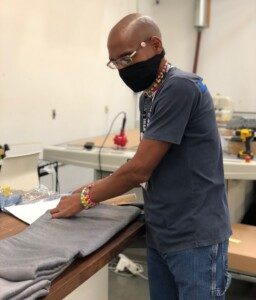I’m glad that Autism Acceptance Month (April) gives me an opportunity to tell my employment success story.
In the process, I hope more businesses and organizations will follow the example of my employer – IKEA – and make their workplaces more welcoming for people with autism and other developmental disabilities.

Marcell Bassett at work at IKEA.
I have worked at IKEA in Costa Mesa, California for more than 25 years, with the help of a job coach who works with me to improve how I deliver on the job and helps me keep on task.
My job coach’s services are paid for by Regional Center of Orange County (RCOC, www.rcocdd.com).
RCOC is one of 21 regional centers throughout California that coordinate these and other services and supports for area residents with developmental disabilities.
When I started at IKEA, my job was to collect shopping carts in the parking lot. After four years in that role, I was promoted to a product quality associate.
This job is a great fit with my skills, and I am proud to have important responsibilities.
I determine the condition of products that are returned by customers, and either re-package those products or prepare them to be sold as-is.
I have been doing my current job for more than 21 years and have gotten very good at it. My job coach is still important to me, but I need less support now and he’s not with me every day anymore.
I work hard to be a good ambassador for IKEA. Since I’ve been on the job for a long time, I sometimes help to train others and guide them as a mentor.
I’m also an ambassador and mentor for Project Independence, the organization that supports me with job coaching.
I hope my experience helps other employers to see what IKEA already knows, which is that people with autism can be valuable, loyal employees who can make a positive contribution in the workplace.
I also want to encourage other adults with autism and parents of children with autism to recognize there is opportunity for them, too.
RCOC only serves individuals in Orange County, California, but there are other organizations that help match people with jobs that fit their skills and interests and provide on-the-job coaching support.
One way to get valuable work experience is to try to get an internship that offers hands-on training, but there are lots of ways to prepare yourself to succeed.
Just as it is for people without autism, it’s important to me to be on my own, to support myself and to pay my own living expenses.
I also have a full life outside of work. When I’m not working at IKEA, I enjoy volunteering. I serve on the Board of Directors for Regional Center of Orange County, which helps me represent the needs and interest of others with autism and other developmental disabilities and their families.
I also run marathons and volunteer at my church. For several years, I’ve also enjoyed volunteering with my local Kiwanis Aktion Club, serving and leading as past president and now as a mentor.
I have a happy life and my job is an important part of that. I enjoy working and want to be real happy every time I show up for work, because my attitude shows people what I can do and what I’m made of.
Not just during Autism Acceptance Month, but throughout the year, the general public and employers, especially, need to know that people with autism can be successful in the workplace and do many of the same jobs that people without autism do. We just need to be given an opportunity to show what we can do.










































